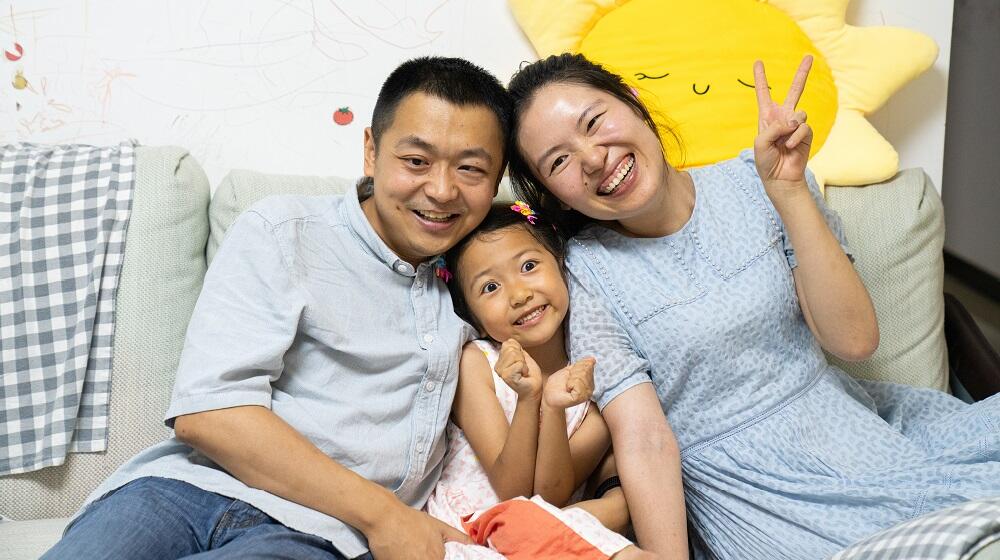BEIJING, China – Going to school, finding a job, getting married and having a child, 35-year-old Cai Cong is living a life similar to many of his peers in China. Being visually impaired but independent, Cai is inspiring persons with disabilities to determine a life they want.
According to official data, there are 85 million people with disabilities in China. Over 17 million of them have some form of visual loss like Cai.
“Your life is completely ruined,” said Cai Cong, recalling people’s reaction to him as his vision deteriorated when he was 10 years old. He suffered glaucoma and permanent eye damage due to improper medicine use.
Even though he has sometimes felt depressed, Cai has never given up his hope for a better future.
A high-ranking student but denied access to information on reproductive health in school
Cai Cong went to school every day. He enjoyed school life, even though he sometimes found it difficult to see text on the blackboard or on test papers. He communicated well with teachers and students and got good grades. However, there was one issue where he felt embarrassed and wasn’t comfortable asking others for information - reproduction.
As an adolescent, Cai was naturally curious about human bodies and how they work. But in traditional Chinese culture, words like sex and reproduction are taboo for adolescents.
Cai did not get a chance to listen to the biology lecture on the reproductive system at middle school. Same to other students but with no additional support, he was asked to self-study the knowledge through reading textbooks.
When he grew up and attended a vocational school on massage, he was again refused the lecture on human anatomy. Cai argued with his mentor that he should be able to attend as he was an adult but his teacher refused, commenting, “anyway, you won’t need it.”
“Disability is a characteristic, not a fault or problem,” Cai comments.
Being an advocate on sexual and reproductive health and rights
In 2010, Cai Cong joined One Plus One, an organization of persons with disabilities in China. For the first time, he learned about the United Nations Convention on the Rights of Persons with Disabilities (CRPD), and the work that international organizations including UNFPA, the United Nations Population Fund did on sexual and reproductive health and rights (SRHR). Ever since then, Cai Cong has become a passionate advocate for CRPD and SRHR issues in China.
Everyone has the right to make choices about their bodies, health and lives and to access sexual and reproductive health information and services. Cai Cong has integrated SRHR into his daily work.
In 2013, he organized a keynote speech on “disability and sexuality” for the first time in China, advocating for the full inclusion of people with disabilities in access to sexual and reproductive health. In 2014, he helped people with growth hormone disorder learn the link between sexuality, gender and their bodies; he supported and introduced sexuality education into visual impairment service centers and mental disorder schools.
Cai Cong became a public figure in 2017 when he appeared on the most famous Chinese talk show Qi Pa Shuo. He won a standing ovation from audience and guests with his witty humor, and his life story in ending stereotypes and stigma for persons with disabilities, and advocating for reproductive rights and choices for everyone.
Cai has a family with a healthy and lovely daughter and a successful wife.
Xiao Jia, Cai’s wife, is the first makeup artist with a disability in China. She used to be a masseuse and experienced sexual harrassment from the guests. Now, she has joined Cai in advocating for the rights of persons with disabilities, calling for an end to violence against women with disabilities.
Cai and his wife broke the stereotype of “blind person” and now he wants, as he says, “to help other persons with disabilities to find more confidence and paths in life and make decisions about their own lives.”
In 2018, with the support of UNFPA and UN Partnership on the Rights of Persons with Disabilities (UNPRDD) project, Cai Cong together with other advocates developed the first-ever Disability Equality Training (DET) Training Manual on SRH in China. Over 40 service providers benefitted from the training and improved knowledge in providing rights based and gender responsive SRH services to persons with disabilities.
Cai has continued his advocacy for persons with disabilities in 2021.
UNFPA, Women Enabled International (WEI), and Rehabilitation International (RI) are developing and testing a training package to raise awareness among organizations of persons with disabilities (OPDs) of the rights of women and young persons with disabilities in the context of SRHR and gender-based violence. It is part of UNFPA’s global initiative, “WE DECIDE: Including and empowering persons with disabilities'', for equal rights and a life free of violence.
Cai Cong is mobilizing over 20 OPDs in China to join the project and giving feedback.
“It is a great opportunity for us, so we can ensure that the training package reflects the needs and interests of persons with disabilities” says Cai.


